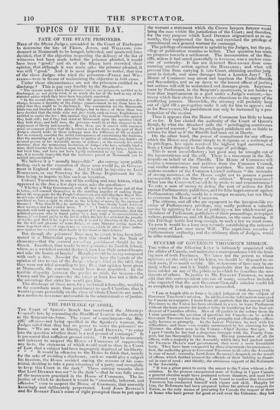THE PRIVILEGE QUARREL.
THE Court of Queen's Bench has sanctioned the Attorney- Ceneral's law, by remanding the Sherifk of London to the custody of the Sergeant-at-Arms. The cause of commitment—the She- riffs' offence—not being specified in the Speaker's warrant, the Judges ruled that they had no power to order the prisoners' re- lease. "We arc not at liberty," said Lord DEN "to enter into the question whether there is a real ground of contempt." It is presumed that sufficient ground exists. " It would be uuseendy and indecent to suspect the House GI' Commons of suppressing any facts, the statement of which NV01.11(1 tend to show in a Court of Law, that a subject had, been itiq;roperly deprived of ltis liberty. lease. "We arc not at liberty," said Lord DEN "to enter into the question whether there is a real ground of contempt." It is presumed that sufficient ground exists. " It would be uuseendy and indecent to suspect the House GI' Commons of suppressing any facts, the statement of which NV01.11(1 tend to show in a Court of Law, that a subject had, been itiq;roperly deprived of ltis liberty. * * It would be offensive to the House to think that, merely for the sake of avoiding a disclosure, such as would give a subject his freedom, the house avoided stating the reasons of his com- mittal, desiring to take a poor advantage of a party, and wrongfully to keep this Court in the dark." These cutting remarks show that Lord DENMAN was not "in the dark"—that he was fully aware of the mem:mere practised in the House of COMMOIIS. The in- justice of which he declared it would be " unseemly, indecent, and offensive" even to suspect the House of Commons, that assembly knowingly and deliberately perpetrated. Lord JouN RessEr,e's and Sir ROBERT PEEL'S sense of right prompted them to put upon the warrant a statement which the Crown lawyers foresaw would bring the case within the jurisdiction of the Court ; and therefore, for the very purpose which Lord DENMAN stigmatized as so un- worthy, they suppressed the filets, and exercised the privilege of commitment on a general warrant for contempt. The privilege ofeommitment is upheld by the Judges, but the pri. vilege of publication remains as before. That question has made no progress towards a settlement. The incarceration of the She- riffs, unless it. had acted powerfully in terrorent, was a useless exer- cise of authority. It has not deterred SrocKDALE from com- mencing another action against the HANSARDS ; and what will prevent him from carrying it into Court, obtaining another judo: ment in delimit, and more damages from a London Jury? ThL House of Commons may arrest and imprison the Under-Sheriffs and Secondaries, and so on down to the lowest officer ofjustice; but actions will still be maintained and damages given. Imprison- ment by Parliament, in the Sergeant's apartments, is not harder to bear than imprisonment in a gaol under a Judge's warrant,—be- tween which their choice lies who are obnoxious to the anger of' the conflicting powers. Alcanwhile, the attorney will probably keep out of sight till a prorogation make it safe for him to appear ; and as for STOCKDALE, his punishment can only be increased by a pro- longation of the session.
Thus it appears that the House of Commons has little to boast of so far. It has eluded the authority of the Court of Queen's Bench, by what the Standard calls the " pettifogging contrivance of a general warrant ;" but its privileged publishers arc as liable to actions for libel as if the Sheriffs had been set at liberty.
On the other hand, the power of commitment for any offence which the House may choose simply to designate as a contempt of its privileges, has again received the highest legal sanction, and from a Court disposed to limit the scope of privilege.
This is most unsatisfitetory ; but good may be wrought out of the inconvenience and the evil. There is a movement in the Me- tropolis on behalf' of the Sheriff's. The House of Commons will receive a remonstrance and petition from the Common Council, and similar addresses from various parishes. We note that one zealous member of the Common Council enforces " the necessity of strong measures, as the Ilouse ought not to possess a power incompatible with the liberty of the subject." Strong measures! What can the Common Council do by protests and remonstrances? To vote a sum of money to defray the cost of actions for libel against Parliamentary publishers, and for false imprisonment against Parlitunentary officers, would be a stronger measure, but not likely to overcome the House of Commons.
The citizens, and all who are repugnant to the irresponsible ex- ercise of Parliamentary privilege, may really perform a valuable service by agitating for a laic of publicity—a law which would put Members of Parliament, publishers of their proceedings, newspitper writers, pamphleteers, and all Englishmen, on the same footing. It' this Privilege battle last long enough, to such a law we must come. To pass it would be a long step towards establishing the universal supremacy of Law over mere Will. The capricious exercise of Parliamentary authority, and the arbitrary dicta of Judges, would be alike restrained.


























 Previous page
Previous page